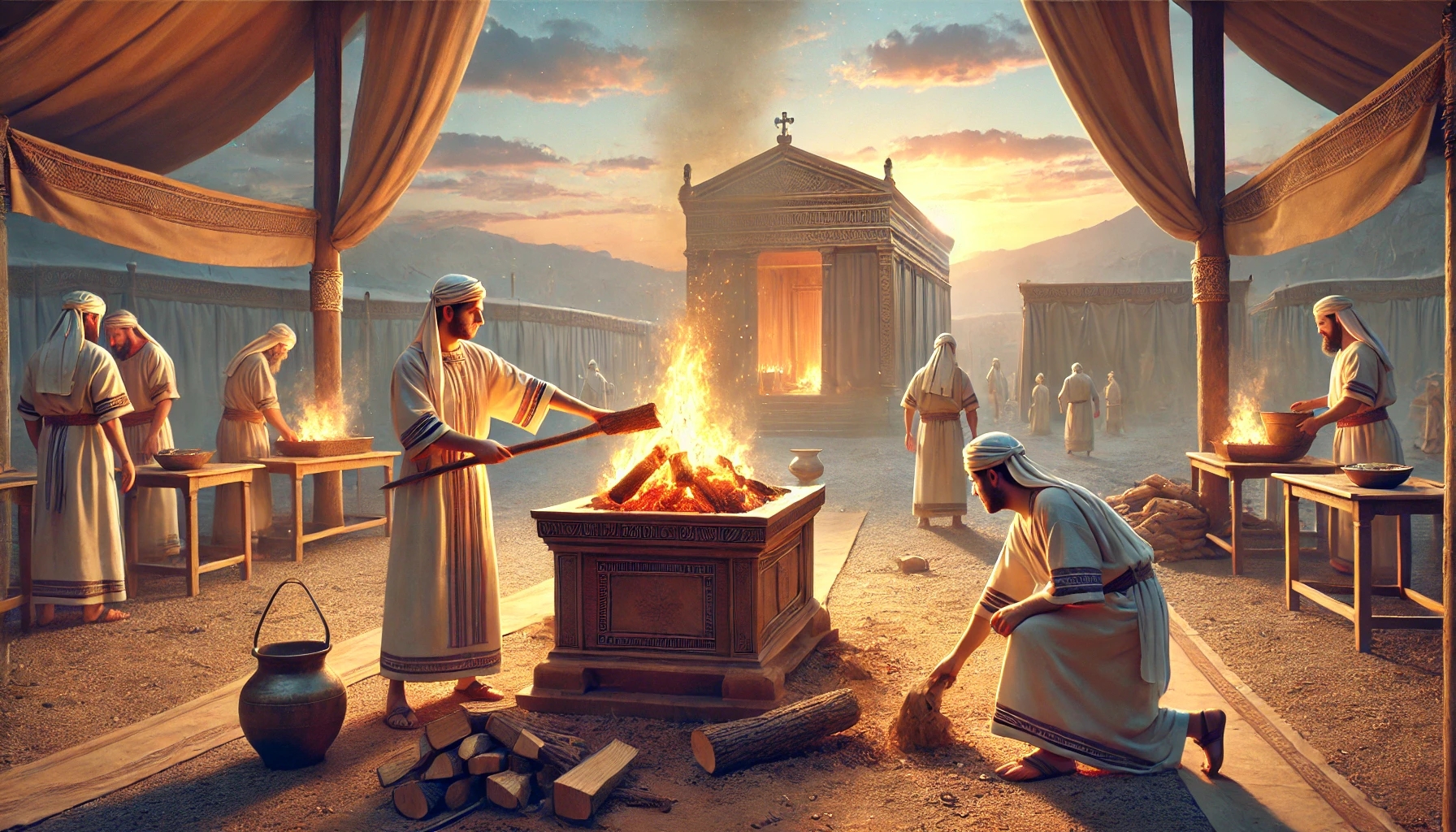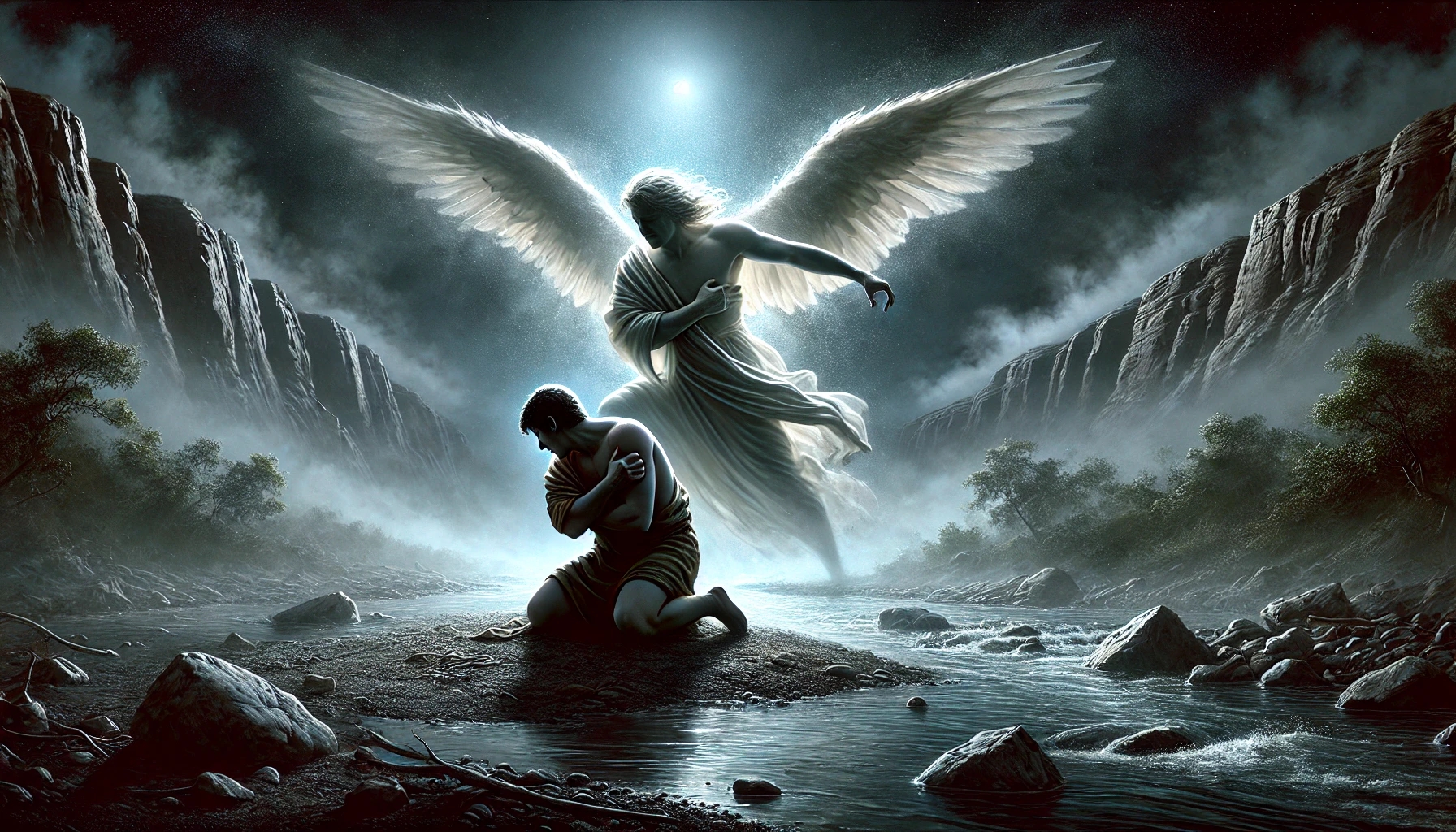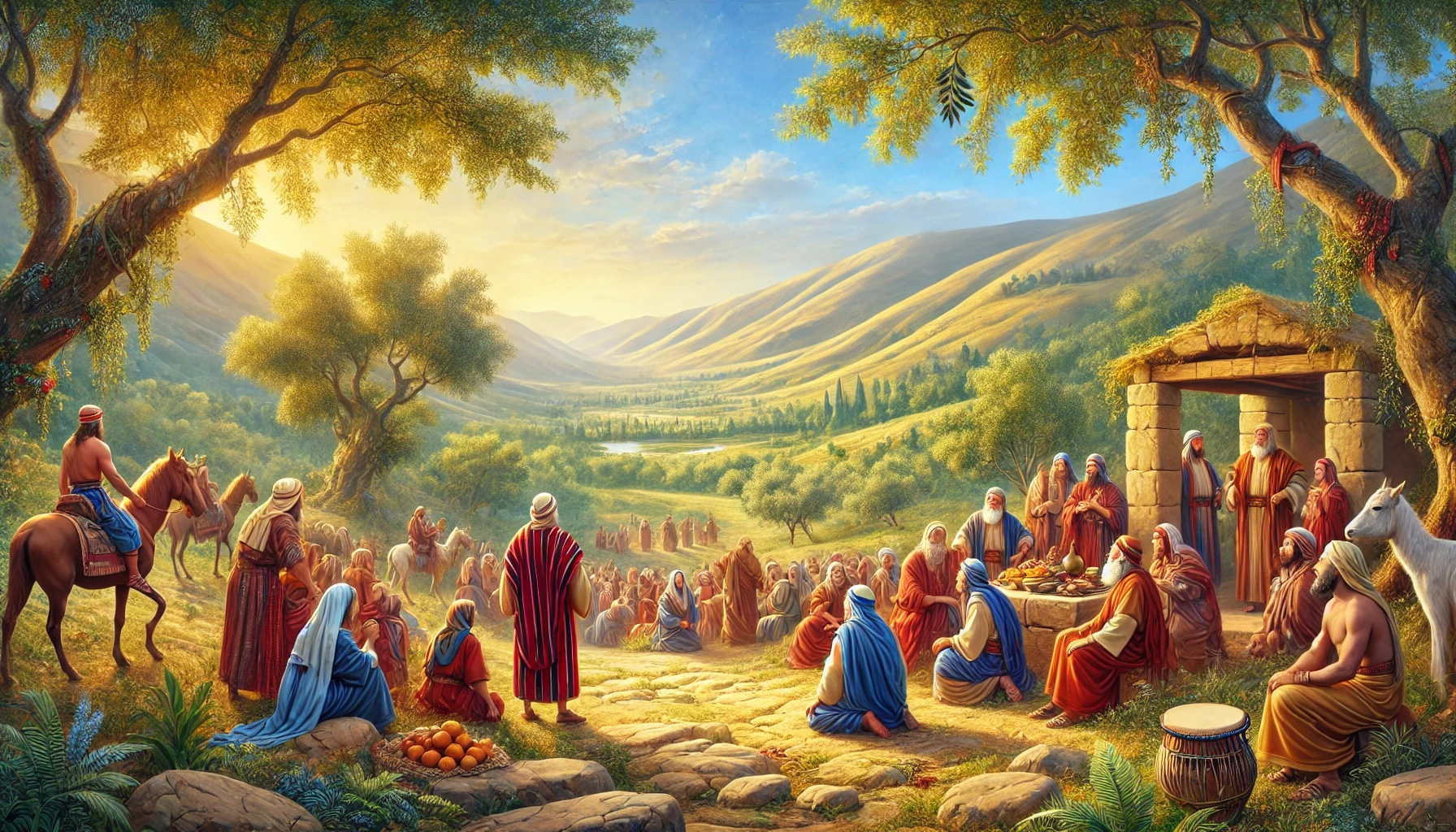
📅 July 21, 2025
📖 DAILY BIBLE READING
✨ Leviticus 6 – Holiness in Everyday Life – God’s Clear Order for Sacrificial Living
🔥 What the burnt offering, grain offering, and sin offering teach us today about dedication, holiness, and service
══════════════════════════════════════════════
📜 Bible Text – Leviticus 6 (KJV)
1 And the Lord spake unto Moses, saying,
2 If a soul sin, and commit a trespass against the Lord, and lie unto his neighbour in that which was delivered him to keep, or in fellowship, or in a thing taken away by violence, or hath deceived his neighbour;
3 Or have found that which was lost, and lieth concerning it, and sweareth falsely; in any of all these that a man doeth, sinning therein:
4 Then it shall be, because he hath sinned, and is guilty, that he shall restore that which he took violently away, or the thing which he hath deceitfully gotten, or that which was delivered him to keep, or the lost thing which he found,
5 Or all that about which he hath sworn falsely; he shall even restore it in the principal, and shall add the fifth part more thereto, and give it unto him to whom it appertaineth, in the day of his trespass offering.
6 And he shall bring his trespass offering unto the Lord, a ram without blemish out of the flock, with thy estimation, for a trespass offering, unto the priest:
7 And the priest shall make an atonement for him before the Lord: and it shall be forgiven him for any thing of all that he hath done in trespassing therein.
8 And the Lord spake unto Moses, saying,
9 Command Aaron and his sons, saying, This is the law of the burnt offering: It is the burnt offering, because of the burning upon the altar all night unto the morning, and the fire of the altar shall be burning in it.
10 And the priest shall put on his linen garment, and his linen breeches shall he put upon his flesh, and take up the ashes which the fire hath consumed with the burnt offering on the altar, and he shall put them beside the altar.
11 And he shall put off his garments, and put on other garments, and carry forth the ashes without the camp unto a clean place.
12 And the fire upon the altar shall be burning in it; it shall not be put out: and the priest shall burn wood on it every morning, and lay the burnt offering in order upon it; and he shall burn thereon the fat of the peace offerings.
13 The fire shall ever be burning upon the altar; it shall never go out.
14 And this is the law of the meat offering: the sons of Aaron shall offer it before the Lord, before the altar.
15 And he shall take of it his handful, of the flour of the meat offering, and of the oil thereof, and all the frankincense which is upon the meat offering, and shall burn it upon the altar for a sweet savour, even the memorial of it, unto the Lord.
16 And the remainder thereof shall Aaron and his sons eat: with unleavened bread shall it be eaten in the holy place; in the court of the tabernacle of the congregation they shall eat it.
17 It shall not be baken with leaven. I have given it unto them for their portion of my offerings made by fire; it is most holy, as is the sin offering, and as the trespass offering.
18 All the males among the children of Aaron shall eat of it. It shall be a statute for ever in your generations concerning the offerings of the Lord made by fire: every one that toucheth them shall be holy.
19 And the Lord spake unto Moses, saying,
20 This is the offering of Aaron and of his sons, which they shall offer unto the Lord in the day when he is anointed; the tenth part of an ephah of fine flour for a meat offering perpetual, half of it in the morning, and half thereof at night.
21 In a pan it shall be made with oil; and when it is baken, thou shalt bring it in: and the baken pieces of the meat offering shalt thou offer for a sweet savour unto the Lord.
22 And the priest of his sons that is anointed in his stead shall offer it: it is a statute for ever unto the Lord; it shall be wholly burnt.
23 For every meat offering for the priest shall be wholly burnt: it shall not be eaten.
24 And the Lord spake unto Moses, saying,
25 Speak unto Aaron and to his sons, saying, This is the law of the sin offering: In the place where the burnt offering is killed shall the sin offering be killed before the Lord: it is most holy.
26 The priest that offereth it for sin shall eat it: in the holy place shall it be eaten, in the court of the tabernacle of the congregation.
27 Whatsoever shall touch the flesh thereof shall be holy: and when there is sprinkled of the blood thereof upon any garment, thou shalt wash that whereon it was sprinkled in the holy place.
28 But the earthen vessel wherein it is sodden shall be broken: and if it be sodden in a brasen pot, it shall be both scoured, and rinsed in water.
29 All the males among the priests shall eat thereof: it is most holy.
30 And no sin offering, whereof any of the blood is brought into the tabernacle of the congregation to reconcile withal in the holy place, shall be eaten: it shall be burnt in the fire.
══════════════════════════════════════════════
🔵 Introduction
Sacrifices and rituals may seem foreign to many today. But Leviticus 6 reveals an important spiritual principle: God is a God of order, holiness, and presence.
What happened in the sanctuary back then is a profound picture of the daily spiritual life of anyone who wants to serve God – even today.
══════════════════════════════════════════════
🟡 Commentary
🔸 1. The Burnt Offering (verses 1–6)
God emphasizes the constant fire on the altar.
It was never to go out – symbolizing that life should be lived in continual dedication to God.
The priest had clear tasks: remove ashes, add wood, maintain the flame.
→ God expects spiritual care and attentiveness – nothing is left to chance.
🔸 2. The Grain Offering (verses 7–16)
The grain offering consisted of flour, oil, and incense – simple, everyday items.
→ A symbol of daily life, work, provision, and gratitude.
Part of it was for God, part for the priests. But it had to be unleavened – symbolizing purity.
Exception for priests: their grain offering was completely burned (verse 16).
→ Those who serve God must give everything, not just a portion.
🔸 3. The Sin Offering (verses 17–23)
The sin offering highlights the seriousness of sin and the need for atonement.
Only consecrated persons were allowed to touch it. Garments, pots – everything had to be cleansed or destroyed.
→ Holiness is not just outward ritual, but penetrates deeply into everyday life.
If the blood was brought into the sanctuary, the sacrifice could not be eaten – it had to be completely burned.
→ A symbol: some sins must be fully surrendered to God – no human use is possible.
══════════════════════════════════════════════
🟢 Summary
Leviticus 6 teaches:
-
Holiness is serious.
-
Serving God requires precision, dedication, and purity.
-
Sin is not something light – it requires cleansing, not justification.
══════════════════════════════════════════════
📢 Message for Us Today
Even though we no longer bring animal sacrifices, the principle remains:
-
Our heart is the altar – the fire of devotion must never go out.
-
Our daily life – work, speech, actions – should be like a grain offering, consecrated and pure.
-
We must not excuse sin, but recognize, confess, and release it.
-
Those who serve God must be willing to give their whole life – not just the parts they choose.
══════════════════════════════════════════════
💡 Reflection Questions
-
What is “burning” on my altar? Is my faith still alive – or has the fire faded?
-
Am I offering my whole life to God – or just what’s convenient?
-
How do I deal with sin – do I hide it, ignore it, or bring it into the light?
~~~~~ 🔥 ~~~~~
📆 July 20 – 26, 2025
📆 WEEKLY SPIRIT OF PROPHECY READING
📖 Ellen G. White │ Patriarchs and Prophets – Chapter 18
✨ The Night of Wrestling
📖 Read online here
══════════════════════════════════════════════
🔵 Introduction
The story of Jacob is a story of hope for everyone who has ever wrestled with guilt, fear, or doubt. Jacob, who once gained the birthright through deceit, returns after years of exile—marked, repentant, but changed. Before him lies a confrontation with his brother Esau—a man who would have every reason to seek revenge.
On the night at the river Jabbok, the decisive turning point comes. There, Jacob wrestles—not just with an angel, but with his past, his guilt, and his God.
══════════════════════════════════════════════
🟡 Commentary
📌 1. Jacob’s Return: Between Promise and Fear
Jacob follows God’s call back to the Promised Land, but fear of Esau paralyzes him. Despite divine promises, he wrestles inwardly with the guilt of his past.
“Then Jacob was greatly afraid and distressed.” – Genesis 32:7
He does everything humanly possible: sends messengers, prepares gifts, divides his flock. But he knows: it’s not enough. He needs God’s intervention.
📌 2. The Night at Jabbok – Wrestling with God
In solitude, Jacob does not flee—he prays. He longs to meet God. Then a mysterious opponent appears—an all-night struggle begins.
No words, just physical wrestling.
But soon it becomes clear: this is more than a man—it is a heavenly being—the Angel of the Covenant, Christ Himself (cf. Malachi 3:1).
Jacob holds on—despite the wound to his hip—and clings to the angel, not asking for power, but for blessing.
“I will not let you go unless you bless me.” – Genesis 32:26
What began as a physical struggle becomes a spiritual victory: Jacob confesses his guilt, pleads for grace, and receives a new name—Israel.
📌 3. The Morning After – From Fear to Reconciliation
Jacob meets Esau—not as a deceiver, but as one marked by God. He limps, but his face shines. And Esau? Instead of anger, he shows grace.
“But Esau ran to meet him and embraced him and fell on his neck and kissed him, and they wept.” – Genesis 33:4
God’s grace touched two hearts: Jacob’s—and Esau’s.
📌 4. A Prophetic Image – Jacob’s Time of Trouble
Ellen White interprets Jacob’s night of wrestling as a foreshadowing of the end time:
God’s people will go through a time of trouble (cf. Jeremiah 30:5–7).
Satan will accuse them, pressing them down with guilt.
But like Jacob, they will cling to God’s promises—despite fear, despite weakness—and God’s grace will carry them.
“Those who, like Jacob, hold fast to God’s promises, will find them fulfilled.” – Patriarchs and Prophets
══════════════════════════════════════════════
🟢 Summary
Jacob wrestles with God—and is blessed.
From deceiver to overcomer: Israel—“he who struggles with God and prevails.”
God’s grace overcomes guilt—not to separate, but to reconcile.
Jacob’s story is also our story: fear, struggle, forgiveness, and new identity in Christ.
══════════════════════════════════════════════
📢 Message for Us Today
Is there something that separates you from God? Jacob shows: genuine repentance is heard.
In the troubles of your life: don’t rely on people, but on God’s promises.
The faith that wrestles through will not be disappointed.
God blesses not the strongest—but those who hold on to Him.
══════════════════════════════════════════════
💬 Reflection Question
What are you wrestling with today? Fear, guilt, doubt?
Are you willing not to let go of God—even if you are wounded?
What promise holds you when everything else falls apart?
“I will not let you go unless you bless me.” – Let these words be your prayer today.
~~~~~ 🔥 ~~~~~
📆 July 20 – 26, 2025
📆 WEEKLY SPIRIT OF PROPHECY READING
📖 Ellen G. White │ Patriarchs and Prophets – Chapter 19
✨ The Return to Canaan
📖 Read online here
══════════════════════════════════════════════
🔵 Introduction
Jacob’s return to Canaan is marked by fulfilled promises, inner renewal—but also by the tragic failures of his sons. The matured patriarch experiences both God’s grace and the consequences of past mistakes within his family. In this chapter of his life, we learn how closely divine blessing is tied to personal responsibility.
══════════════════════════════════════════════
🟡 Commentary
📌 1. Gratitude and Worship in Shechem
Jacob arrives “safely” in Shechem—a testimony that God has kept His promise. He buys land, builds an altar, and publicly confesses: “God is the God of Israel.” His faith is seen in daily life through worship, sacrifice, and gratitude.
📌 2. Dinah’s Tragedy and the Massacre at Shechem (Genesis 34)
The incident with Dinah reveals how dangerous it is to open oneself to the influence of a godless culture. The brutal revenge carried out by Simeon and Levi brings shame upon the family. Jacob perceives the moral decline of his sons and is deeply shaken. This episode marks a dramatic setback on their spiritual journey.
📌 3. Purification and Return to Bethel
God calls Jacob back to the place of promise. But before reaching Bethel, Jacob leads a spiritual reformation in the camp. Idols and foreign jewelry are buried—a symbol of renewed consecration. In Bethel, God appears to him again and renews the covenant.
📌 4. Tragedies Along the Way: The Deaths of Deborah and Rachel
The final stages are marked by loss. Rachel dies during Benjamin’s birth—a profound sorrow for Jacob. Her love had shaped his life. The death of Rebekah’s nurse, Deborah, stirs up old memories. At the same time, God calls Jacob again to faithfulness.
📌 5. Return to Hebron – Reconciliation with Esau
Jacob meets Isaac again and cares for him in his final years. A peaceful reunion also occurs with Esau. However, the brothers live separately, as their life paths have grown too different.
📌 6. The Legacy of Parenting: Joseph and His Brothers (Genesis 37)
The effects of jealousy, favoritism, and a polygamous family structure are now painfully visible. Joseph is the child of hope—sensitive, God-fearing—but also the target of his brothers’ hatred. His sale into Egypt becomes the next phase of God’s redemptive plan.
══════════════════════════════════════════════
🟢 Summary
Jacob returns under God’s protection to the Promised Land. He experiences God’s faithfulness but also faces family conflicts, sin, and painful losses. His sons reveal deep character flaws—especially in their betrayal of Joseph. Yet amid the chaos, God’s plan begins to unfold through Joseph, whom He will save and elevate.
══════════════════════════════════════════════
📢 Message for Us Today
God’s promises are fulfilled—even when our path leads through guilt and suffering.
Families need spiritual leadership and purity—compromise comes at a high cost.
Repentance, cleansing, and returning to God bring a new beginning.
Our choices affect generations—for blessing or pain.
What people intend for evil, God can still turn to good.
══════════════════════════════════════════════
💬 Reflection Question
Are there “foreign gods” in your life—things that crowd out your devotion to God?
Where is God calling you back to a “Bethel moment” of renewal?
Is your home a place where God is worshipped—daily, visibly, together?
Are you letting God shape you—even through your past mistakes?
“God never turns away anyone who returns to Him in sincere repentance.”






















